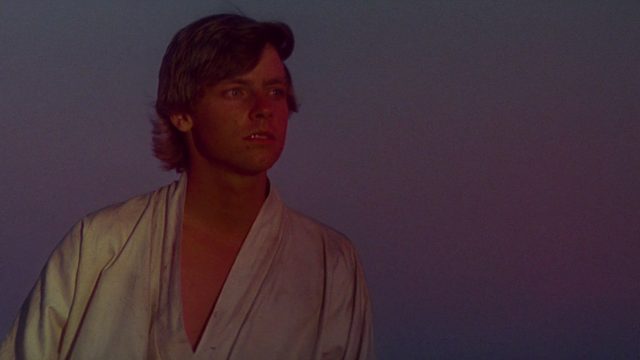I’ve been wondering lately if there isn’t a certain implicit backlash towards Star Wars and the Hero’s Journey in the dystopic trends in YA material. My generation – I was born in 1977, the year Star Wars was released – grew up with a steady diet of being told that we’re super special, even if it’s only secretly. If there’s a story being told about two total Jedi in a galaxy of billions, the person I-the-viewer should identify with is the one impossibly talented farmboy in that entire galaxy who just so happens to be the son of the galaxy’s terrifyingly powerful Force user and inherited these powers himself. It’s a baldly preposterous notion by any stretch but we ate it right up, and material made by people our generation and slightly older still loves the idea. (The worst culprit in my mind is still probably that Tim Burton Alice In Wonderland remake, which pounded one of the most surreal works in popular culture into a Star Wars-y mold for like four or five different Hero’s Journeys — even the dog got one!)
Philosophically, it’s a vacuum: nobody is that special, not even walking archetypes/stereotypes like our current sitting president. In fact, we have diagnosable psychological disorders surrounding a monomaniacal version of this worldview for lots of very good reasons. And speaking of developmental psychology, the attitude is profoundly regressive: “magical thinking” isn’t a good thing.
So, it sold a worldview that simply wasn’t true, no matter what your personal beliefs are, but it tasted good to us and we loved it. Fast forward a few years, and now we have a whole flock of movies with dread as their main selling point. I’ve mentioned it here before, but I’m convinced that <old>movies these days</old> might surprise us with plot points, but the idea is that the audience, watching the movie, will feel exactly what they expect to feel, going in. And judging by the trailers, the emotion that sells tickets is dread. Even something as pulpy-fun as the Pacific Rim 2 trailer is selling the threat of impending destruction as the “fun” part alongside – y’know – the giant monsters or the mecha we’ve built to fight them. It’s not a necessary burden to give the story heft, it’s a crucial part of why the trailer-makers hope people will come to the theater.
Like I said, I wonder if these two trends as connected, if there’s a distinct parallel between the lie that “I am secretly the most powerful being in the universe” and the dread that “I am facing a capricious, incomprehensible universe that is vastly larger than me.” So far, the tales have involved heroically overpowering the vast evil forces at work, but honestly, I don’t really expect that optimism to last forever. Something a great many of us are learning in this current climate is that sometimes, things don’t go the way any of us want them to.
As a postscript, if there’s anything to this idea, then Harry Potter was a crucial transitional work in all of this. It starts out as pure power fantasy escapism, secretly-the-chosen-one, welcome-to-this-new-magical-life, etc. but it very carefully morphs over the course of the series into something much closer to a YA dystopia: being “chosen” means suffering and dying (which is something the Bible, at least, would agree with) and everything just generally sucks. The moments of joy are few and fleeting, and a high tolerance for discomfort is a strong virtue. These aren’t Star Wars attitudes, to put it mildly–even Anakin got to go play (“Yippee!”) when his work was done—as a child slave.

